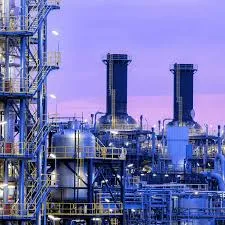
Nov . 16, 2024 19:03 Back to list
Thermal Fluid Heating Systems for Efficient Industrial Applications and Energy Savings
The Efficiency and Importance of Thermic Fluid Oil Boilers
In various industrial applications, thermic fluid oil boilers have become essential for efficient energy transfer and heat management. Unlike conventional steam boilers, which operate using water, thermic fluid boilers utilize organic thermal fluids that have high boiling points and excellent heat transfer properties. This unique characteristic allows them to deliver heat for a variety of applications while maintaining operational efficiency and safety.
One of the primary advantages of thermic fluid boilers is their capability to provide consistent and stable heat at high temperatures, typically ranging from 300°C to 400°C (572°F to 752°F). This high-temperature operation can lead to improved process efficiencies, particularly in sectors such as chemical processing, textiles, food and beverage, and plastics. For example, in the food industry, precise temperature control is critical for processes like frying, drying, and baking, where thermic fluid boilers can ensure that the desired temperatures are maintained throughout the operations.
Moreover, the thermal fluids used in these boilers offer a lower pressure operation compared to steam systems. This results in fewer safety hazards and a reduced risk of boiler explosions. For manufacturers, this means lower insurance costs and a safer working environment for employees. The reliability and stability of thermic fluid systems make them preferable for long-term, continuous operations.
thermic fluid oil boiler

Efficiency is another crucial factor in the growing popularity of thermic fluid oil boilers. They are designed to minimize heat losses, providing an economical solution for heating needs. Their closed-loop system circulates the thermal fluid, thus ensuring that heat is effectively transported to where it is needed without significant losses. Advanced designs incorporate features like multi-stage economizers that capture residual heat and improve overall energy efficiency.
Furthermore, thermic fluid oil boilers have a reputation for being environmentally friendly. Many modern systems are designed to operate with minimal emissions, and the thermal fluids used can often be sourced from renewable materials. Additionally, as industries are increasingly pressured to reduce their carbon footprint, thermic fluid boilers can contribute positively by improving energy efficiency and utilizing greener fuels.
Despite their many advantages, the selection of a thermic fluid boiler requires careful consideration of various factors, including the choice of thermal fluid, material compatibility, and system design. Proper maintenance and regular inspections are crucial to ensure the longevity and efficiency of the system. Procedures for monitoring fluid quality and temperature control are essential to prevent degradation of the thermal fluid, which can lead to reduced performance or even system failure.
In conclusion, thermic fluid oil boilers represent a reliable, efficient, and safe choice for various industrial heating applications. Their ability to provide high-temperature heat at low pressure, coupled with their energy efficiency and environmental benefits, positions them as a vital asset in modern industrial processes. As industries adapt to a changing energy landscape, the role of thermic fluid oil boilers will continue to grow, delivering reliable solutions to meet diverse heating requirements.
-
High-Efficiency Commercial Oil Fired Steam Boiler for Industry
NewsJul.30,2025
-
High-Efficiency Biomass Fired Thermal Oil Boiler Solutions
NewsJul.30,2025
-
High Efficiency Gas Fired Thermal Oil Boiler for Industrial Heating
NewsJul.29,2025
-
High-Efficiency Gas Fired Hot Water Boiler for Sale – Reliable & Affordable
NewsJul.29,2025
-
High Efficiency Biomass Fired Hot Water Boiler for Industrial and Commercial Use
NewsJul.29,2025
-
High-Efficiency Biomass Fired Hot Water Boiler for Industrial Use
NewsJul.28,2025
Related PRODUCTS






















